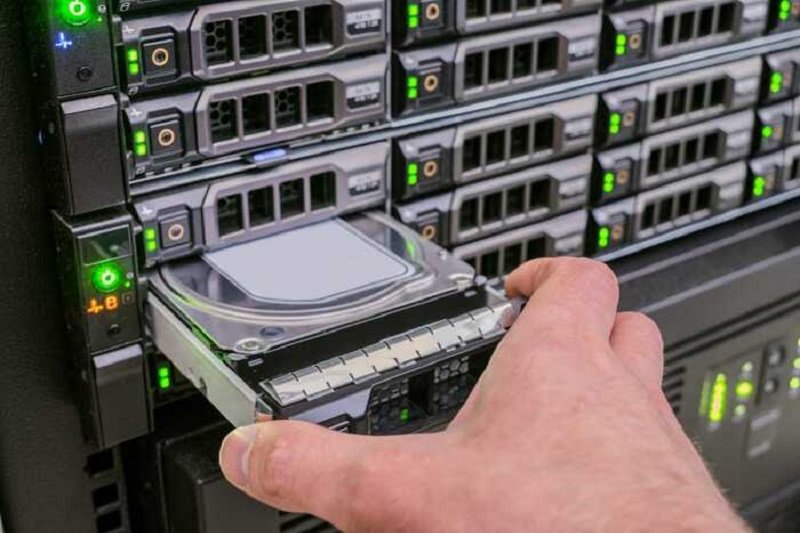How To Choose The Best Hard Drive For The Server?
Hard Disks Have A Direct Impact On The Speed And Performance Of Servers. To Be More Precise, If Servers Use Hard Disks That Do Not Have The Attractive Speed Or Quality, It Will Negatively Affect The Business Processes Of Businesses.
In this article, we will learn how to choose the right hard drive for servers. In addition, we are introduced to important points that we must pay attention to when choosing a server hard drive.
What is a server hard drive, and how is it different from a regular hard drive?
Hard disk servers differ in terms of power, speed, and endurance compared to computer hard disks. For example, when buying a hard drive, the server should be careful about disk rotation speed and hard drive relationships. The faster the disk spins, the shorter data is written and read to the hard disk.
Important differences in this area include the following:
- In addition, the cooling mechanism, vibration detection, correction sensors, and airflow control on server hard drives are different from desktop hard drives.
- Server hard drives perform more accurately than traditional hard drives about the Error Detection and Correction feature.
- Server hard disks are divided into two types: Simple swap and Hot Swap. Hot-swap hard drives can be removed or replaced from the server without shutting down. Simple Swap Hard Drives are regular hard drives that have a mostly blue shelf.
- Almost all medium and large organizations and companies use RAID configuration in connection with server hard disks. Hardware Server Hardware (ECC) has a feature called Error Recover Control, which provides accurate information to the network expert to control the error in the RAID environment. This feature is Time-Limited Error Recovery on Western Digital Hard Drive (TLER), Command Completion Time Limit on Samsung and Hitachi CCTL, and Error Recovery Control on Seagate Hard Drive (ERC).
- Server hard drives have a longer lifespan than regular hard drives. In addition, they have more reliability, speed, and price.
- Server hard disk response time is longer than normal hard disks and has more memory cache.
Server Hard Disk Relationships
In general, server hard disks are divided into the following six main groups in terms of data transfer interface.
- SCSI is the oldest option on the market, based on old technology, and is no longer produced.
- SAS: An interface that supports a speed of 1200 Mbps, 15,000 rpm, and a throughput of 12 Gbps. This interface is used when a high speed with a redundant rewrite cycle is required. For example, the server is to be used as a transaction and transaction management system in the form of a server terminal and 1C-server, in distributed systems, a web server with a fast loading time, a database management system, and so on.
- NL-SAS: Hard disks based on this technology are known as enterprise hard drives because they are very durable.
- FDE / SDE: It functions similar to the SAS bus, except that encryption capability has been added.
- FC: Used in network storage devices and can use fiber optic transmission protocol to achieve higher speed.
- SATA: The SATA Transfer Bus, also known as the Serial Transfer Bus, is also available on desktop computers. The above technology has the ability to correct errors automatically and provides good security when transferring data. In addition, SATA supports advanced features such as differential-signal-amplified-system to filter noise from the signal and operate at lower power. The operating speed of this interface is between 5400 and 7200 pm, and it offers a total operating power of 6 Gbps.
Classification of server hard disks based on technology
Server hard drives can be technologically divided into the following three groups:
- Hard disks: These hard disks are large mechanical parts, and information is stored on the hard drive screen. These hard disks describe the rotational speed of the RPM idle disk (rpm). RPM includes values such as 15000, 10000, 7200, 5400. The higher the RPM, the shorter the disk rotation latency and access time, significantly increasing performance.
- Solid-state memories: Solid-state memories do not have any mechanical parts and do not have any head for reading and writing information. This increases their lifespan and speed. In addition, the absence of mechanical components makes solid-state memories more resistant to physical damage. Solid-state memories store data on flash memory and are available in 120 GB to 2 TB capacities on the market.
- NVMe: Non-Volatile Memory Express was first introduced in 2013. NVMe is a type of solid-state memory mounted on the motherboard’s PCIe slot. PCIe is fast and offers speeds of up to 32 Gbps and 3.9 Gbps. The main use of these hard drives is in video editing and tasks that require high speed.
What are the significant benefits of solid-state memory for servers?
Solid-state memories have better speed and performance than hard disks. In addition, special features of solid-state memory improve system speed and performance. However, the most important advantages that solid-state memory offers to servers are the following:
Higher performance and better latency: Solid-state memories increase data read and write speeds, unlike solid-state memories, which work on a random read pattern and must be placed in the exact location on the disk plotter before data transfer can begin. They are mobile. This eliminates the latency and speeds up data access. Solid-state memories still provide better IOPS and more accurate data access despite Seek Time to reduce latency.
Reduce system startup time
Run and load software without interruption
Supports DDR4 input and output interface
High speed in copying all kinds of files
Less power consumption and therefore less heat (because solid-state memories do not have a motor, they consume less energy compared to hard drives, so that in the idle mode, they consume only two watts, and in the maximum mode they consume nine watts of power). .)
Solid-state memories have much higher resistance to vibration and shock than hard disks.
Reliability, stability, and durability of information
Since it is easy to replace hard drives with solid-state memory, there is no need for special changes in the system. For this reason, it is possible to install them in HDD Hot Plug frames.
Of course, it is important to note that it is impossible to combine them in a logical array with traditional hard drives, but they can be combined in the system to get the most out of their performance.
Of course, keep in mind that solid-state memory is more expensive than hard disks, and if you are looking for more storage capacity, you should use a combination of traditional hard disks and solid-state memory.
Therefore, it should be said that solid-state memory is better to use in enterprise environments that require better performance with less latency.
HPE hard drives
Typically, companies welcome HPE hard drives because they provide ideal performance for servers. HPE hard drives provide seamless performance for every cover volume and benefit from the best security standards. In addition, they have the lowest cost per gigabyte. These hard drives use two user interfaces, SATA 6G and SAS 12G, and are available in two forms, 3.5-inch LFF and 2.5-inch SFF.
These hard drives are used for the following purposes.
- Enterprise workload: SAS 15K and SAS 10K enterprise hard disks can provide the best level of performance and reliability for time-sensitive and input-output applications.
- Midline workload: This group of SAS / SATA 7.2K hard drives can provide better capacity, performance, and reliability for commercially sensitive input and output applications.
- Entry workload: Hard disks in this group are intended for normal use but offer good storage capacity for the price you pay to buy them. Of course, these hard drives are only supported on HP ProLiant servers on Entry / SMB servers.
Overall, HP server hard drives and being cost-effective, offer good hardware capacity with optimal reliability.
If you are looking for hard disks for servers that require a large amount of storage, and on the other hand, the factors of reliability and cost are significant, it is a good idea to go for HP’s Midline series server hard disks. These hard drives are a good option for data centers.













